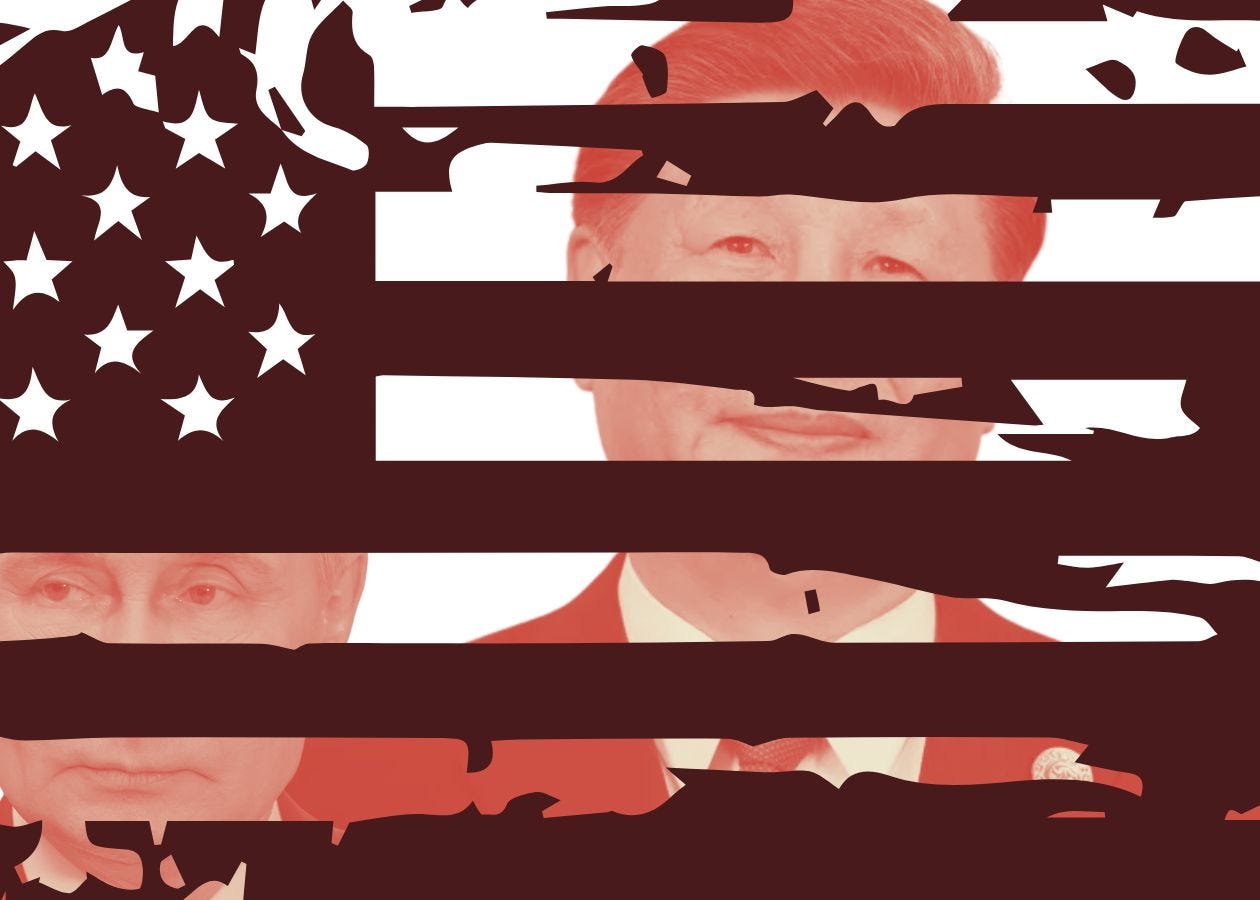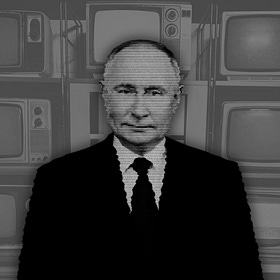Political Violence Is a National Security Problem
America’s enemies have a history of exploiting our domestic dysfunction.
EDITOR’S NOTE: Americans’ First Amendment freedoms face unprecedented threat. We’re hosting an exclusive Zoom call with Garry Kasparov to address this crisis, this Thursday, September 25 at 12pm ET/9am PT. Space is limited in order to keep the discussion interactive. Don’t wait to sign up. Register here.
Jack Thomas Tomarchio is an attorney in Philadelphia. He served as principal deputy undersecretary of Homeland Security for Intelligence under President George W. Bush.
The assassination of right-wing political activist Charlie Kirk two weeks ago is a tragedy. It is the latest high-profile politically-motivated attack in this country, a scourge that claimed the lives of Minnesota House Speaker Melissa Hortman and her husband and nearly killed Paul Pelosi and even Donald Trump himself.
After Kirk was killed in Utah, many politicians issued cookie-cutter denunciations of political violence. Yet the national security ramifications of Kirk’s death—and political violence writ large—were strikingly absent from the public discourse. That’s a mistake. As a former intelligence official, I can tell you: When blood is spilled in our streets, unfriendly powers take notice.
Case in point: Just hours after Kirk died, my local Fox News affiliate asked me to appear on the 10 o’clock news to give my analysis of the situation.
The producer apologized for calling me since, saying, “This is not really a national security matter, which is what we usually call you for.”
I disagreed. Here’s why.
A lesson from Napoleon Bonaparte
“Never interrupt your opponent while he is in the middle of making a mistake.” It’s a strategic lesson commonly attributed to Napoleon Bonaparte.
As the logic goes, let your enemy wear themselves out with internecine battles until they lose their unity of will—in turn, erodes their national resolve and ability to oppose you.
The partisan rancor and the race to weaponize Charlie Kirk’s death plays right into this strategy. Russia and China await such developments with great anticipation.
Almost immediately after Kirk’s death, many right-wing pundits, influencers, and elected officials including President Donald Trump began calling for vengeance.
Right-wing provocateurs Alex Jones and Steve Bannon both announced that Kirk’s death meant “war” with the left. Representative Marjorie Taylor Greene demanded a “divorce” between red states and blue states—in other words, a dissolution of the union. Before a suspect had even been identified, Donald Trump pronounced that the killer was a member of the radical left. Senior Trump advisor Stephen Miller vowed that the administration would hunt down all leftist groups in the United States. And while it hardly merits the administration’s aggressive response, some far-left social media users did throw fuel on the fire by celebrating Kirk’s murder—ignoring the sheer horror of a young husband and father being killed in front of scores of students.
America’s rivals can follow Bonaparte here: Don’t interrupt our downward spiral. Let the fevered rhetoric speak for itself. Declarations like these which call for violence against Americans are tailor-made for our enemies in China and Russia, both of which have amplified the worst responses to this month’s assassination
More from The Next Move:
Cold War precedent
We don’t even have to look back as far as Napoleon to see the roots of this strategy. The Soviet Union eagerly exploited America’s violent domestic disarray in the 1960s.
That turbulent decade offered ample grist for the communist propaganda mill. The deadly race riots in LA’s Watts neighborhood in 1965 and in other major cities a few years later. The assassinations of Martin Luther King and Robert F. Kennedy just two months apart. The anti-war demonstrations—and the heavy-handed police response—that disrupted the 1968 Democratic National Convention in Chicago.
Soviet propagandists pointed to these events as proof positive that American society was unraveling and that our democratic system was at the breaking point. American diplomats posted in Moscow at the time noted how Soviet media painted a stark picture of life in the United States in order to reinforce the supposed superiority of their regime. The Soviets played both sides, on the one hand framing America as neo-colonial in order to hurt US ties with the developing world, while on the other discrediting King and other civil rights activists as being co-opted.
True to his KGB training, Vladimir Putin never fails to remind the world of America’s long history of racial and economic inequality. As a former senior intelligence professional, I am familiar with the methods used by our adversaries to capitalize on fissures in American society.
The opportunities today for spreading anti-American rhetoric are further amplified by the ubiquity of social media, “fake news,” and other forms of mass information dissemination. As such, America’s enemies can reach a far wider audience than Soviet propagandists ever could sixty years ago.
International consequences
The attacks on Kirk, Paul Pelosi, Melissa Hortman, and others offer Russian and Chinese operatives ample evidence of a divided America coming apart at the seams.
And these stories do not happen in a vacuum. The succession of knock-on controversies that follows such an attack becomes a renewable resource for US rivals. Take, for example, ABC’s firing of Jimmy Kimmel after pressure from the federal government over the comedian’s comments about Charlie Kirk. Russian outlet RIA Novosti found a place to shoehorn in Kirk’s pro-Russia, anti-Ukraine views into their coverage of Kimmel’s dismissal.
All of this information can be weaponized in a number of ways.
It can be leveraged in countries in transition between democracy and dictatorship like Hungary and Turkey to sell an authoritarian future with China and Russia rather than in the US.
America’s social self-immolation may also impede our ability to pay attention to events now unfolding in Asia and Eastern Europe. American dysfunction didn’t cause Soviet actions in the Cold War, but it’s no coincidence that the US was unable to do anything meaningful when the USSR invaded Czechoslovakia in 1968 or Afghanistan in the late 1970s—both periods of serious domestic malaise in the US.
American distraction at home could now be viewed as a green light by Putin and Xi Jinping to conduct their own variety of geopolitical mischief in Europe and Taiwan. Already, recent incursions by Russian drones and fighter planes into the airspace of NATO members Poland, Romania and Estonia should signal that Putin sees an opportunity.
Refocusing
What can be done?
Obviously, the domestic political temperature needs to be dialed back. In the aftermath of major outbursts of political violence, it would be nice if the president could play his customary role of “uniter in chief.” But I’m here to put forward realistic recommendations.
Members of the legislative branch, however, may have a moment here. Elected representatives need to carry back to their districts the danger that the current political climate of hate poses for our national security. Members of the House and Senate must educate their constituents as to how enemies are exploiting our pitched political battles for their own benefit.
Further, our elected representatives need to provide peaceful outlets for our anger. People do not know how they can act productively on the issues and causes they are passionate about. Hostile entities are all too eager to fill this gap.
Political violence is incompatible with democracy. The US and our foreign allies face significant security risks around the world. There is a global conflict raging between free and unfree countries. That is not a war we need to bring home.
Remember, we have met the enemy, and he is not us.
More from The Next Move:
The Russians Are Loving This
Charlie Kirk’s assassination and political violence in America have Russian propagandists downright giddy. It’s all fodder for a war being waged on social media.
I Saw How Russia Killed Media Freedom
Censorship is central to the story of Russia’s descent into KGB dictatorship.








Liberal democracies like Canada and the European Union are quietly absorbing the moral slack left by the United States. They are resettling refugees, enforcing climate commitments, and defending human rights while the U.S. continues to extort allies through trade, military dependency, and financial leverage.
Transactionalism is replacing values-based diplomacy. Human rights are now negotiable. And the United States no longer pretends otherwise.
So why do liberal democracies still treat the U.S. as a moral compass while being shaken down for obedience?
The truth is, many are already hedging. They are building regional resilience, forging multipolar alliances, and quietly disentangling.
Well said